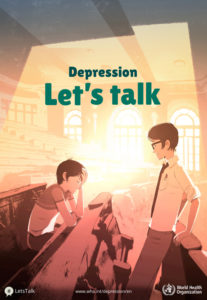 World Health Day is celebrated on 7 April every year to commemorate the founding anniversary of the World Health Organization. The theme for this year’s campaign is depression. Depression is a common but serious mental disorder with potentially severe symptoms that can negatively affect a person’s thoughts and emotions as well as ability to cope with daily work, social and family activities. It affects people of all ages, from all walks of life, in all countries. The risk of becoming depressed is increased by poverty, unemployment, life events such as the death of a loved one or a relationship break-up, physical illness and problems caused by alcohol and drug use.
World Health Day is celebrated on 7 April every year to commemorate the founding anniversary of the World Health Organization. The theme for this year’s campaign is depression. Depression is a common but serious mental disorder with potentially severe symptoms that can negatively affect a person’s thoughts and emotions as well as ability to cope with daily work, social and family activities. It affects people of all ages, from all walks of life, in all countries. The risk of becoming depressed is increased by poverty, unemployment, life events such as the death of a loved one or a relationship break-up, physical illness and problems caused by alcohol and drug use.
Depression is a real illness with real symptoms and should never be discounted as a sign of mental weakness or moral flaw. Early diagnosis followed with appropriate treatment and support is critical for facilitating a complete recovery; which is possible for the vast majority of people who are afflicted with it. Typical treatment options usually involve either a talking therapy (psychotherapy) or antidepressant medication or a combination of these.
Unfortunately, the stigma and cultural myths surrounding mental illness in general presents a formidable barrier to people reaching out to seek help as well as getting support from their family members and friends. To break down this barrier, it is important for all of us to be able to discuss openly the various issues related to depression when interacting with our family members, family physicians, work colleagues and also the wider community through social media.
What makes this issue particularly critical to address is the strong correlation between suicidal ideation and depression. Each year, almost 5,000 young people in the age group of 15 to 24 die from suicide. Suicide is the third leading cause of death in adolescents and the second leading cause of death among college-age youth. The 2015 National Health Morbidity Survey (NHMS) revealed that 4.2 million Malaysians aged 16 and above (29.2 percent) were struggling with mental health issues, up from 11.2 per cent in 2006. A similar worrying trend has been noted amongst students, with the figures rising from one in 10 individuals in 2011 to one in five in 2016. Experts cite anxiety and depression as the main causes of mental health problems among students.
The Befrienders KL plays an important role in this respect by providing emotional support to those who are struggling with depression, particularly when they are afflicted by suicidal thoughts. The unconditional acceptance and empathy offered by our trained helpline volunteers can be a veritable life line to those who are despairing from their prolonged struggle with their condition. To be able to share one’s inner most emotional turmoil and pain in an open and non-judgmental environment often provides some measure of relief that pulls a person back from the brink.
Befrienders KL is part of the Befrienders Worldwide, an organization that has its roots in the Samaritans UK and is now present in over 40 countries worldwide. Our vision is a world where fewer people feel the need to end their own lives. Emotional support is provided through 3 primary channels: a telephone helpline that is available 24 hours every day throughout the year (03-79568145), face to face through a prior appointment and email at sam@befrienders.org.my. We are also actively involved in outreach to the community, particularly to groups at high risk of suicide, to provide on-site emotional support, talks, workshop sessions and seminars on listening skills, suicide prevention, capacity building and mental health awareness.
Victor Tan
Hon. Secretary, The Befrienders KL
